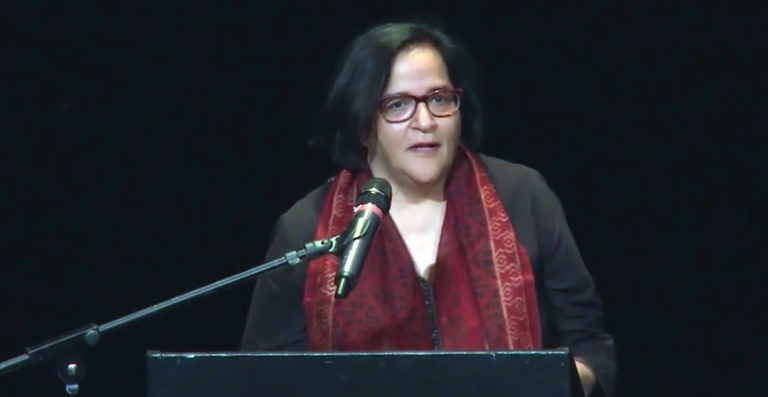“Black Lives Matter” Course Relaunched at RIC
- News & Events
- News
- “Black Lives Matter” Course Relaunched at RIC

"RIC's Africana Studies Program gave me the foundation and the inspiration to continue to love, to study and to struggle," says Charina Herrera '20.
After the death of African-American George Floyd while in police custody and the subsequent Black Lives Matter protests nationally and globally, Assistant Professor of Africana Studies Sadhana Bery was flooded with email from current majors and alumni of the program anxious to discuss the issues of the day.
"I set up Zoom meetings, where we could all meet regularly," she says. "I also provided readings. It was because of these conversations that I decided this semester would be a good time to bring back my 'Black Lives Matter' course."
"I begin the course by examining the system of racism in this country," she says. "You can't talk about the Black Lives Matter movement until you look at the systemic white supremacy in which it exists. Racism is more than privilege, it's more than entitlement, it's a social system."
Through extensive films, readings and discussion boards, her students explore such questions as: What does it mean to argue, as the proponents of Black Lives Matter argue, that when black people get free, everybody gets free? What are the global movements that have been inspired by Black Lives Matter? What does trauma, repair and healing look like? And what is your vision of freedom and justice?

Students complete the course with a final paper on how Black Lives Matter intersects with their lives. Each student also presents a 15-to-20-minute talk on the vision that Black Lives Matter is creating for the future. Lastly, they come up with an action plan focused on what they can do to take an active role in change.
"In recent months, a big focus of the Movement for Black Lives has been on setting up mutual aid groups in all the major cities," Bery says. "Mutual aid has always existed in the Black community since the time of slavery onward. In my course, we look at practical ways in which this can be done, such as community food boxes and community fridges, where perishable and nonperishable food is made available to people in the community. The idea is to create sustainable communities."
As a nation, there is an urgent need, Bery says, to understand the Black experience and the impact of race on the life and institutions of the United States. As director and the only faculty member in RIC's Africana Studies Program, "this program is the only program on campus that offers courses on Black history and the Black experience," she says. "I believe it is important work. It has been my life work."
Alumni of the Africana Studies Program agree about the program's importance. Charina Herrera '20, who is currently a Ph.D. candidate at Northwestern University's Department of African American Studies, remarks, "Without the Africana Studies Program at RIC, I would not be where I am today. It urged a paradigm shift, where it became clear that none of us will be free until all of us are free. The program gave me the foundation and the inspiration to continue to love, to study and to struggle."
Recently the Africana Studies Program received over $3,000 in donations from RIC Foundation's The Future is Bold Campaign. Priority for these funds will be to support student scholarships and research, Bery says. The campaign will run throughout the remainder of the academic year with the hope of raising additional philanthropic support.
Sadhana Bery is a native of India. Her research focus is on critical race theory, white supremacy and whiteness, Black feminism, hauntology (the idea that past social injustices and social violence continue to shape the present and impact the future) and the making of memories and amnesias of social violence.
